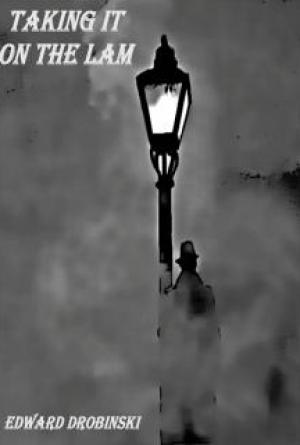CHAPTER XXVII
“SO HOME AND TO BED”
WITH one twitch on a bit of black thread, Graham had made his confession, his atonement and his escape from the law. A few moments later Landis descended to the library, telephoned quietly for an ambulance to come to the door at the end of the wing and rang up the local prosecutor to make an immediate appointment at his home.
He hung up and walked to the hall doorway. Family and guests were still at lunch, for no unusual sound had penetrated from the second-floor wing to the dining-room. Russell and Anita looked up and saw him there but chose to ignore him. Presently Stimson appeared at the far side of the table. Landis caught his eye, beckoned to him and stepped back.
Stimson finished his task of the moment, then crossed the hall and entered the library. Just as he appeared, Bernard came silently through the door at the far end, having descended the wing stairs. Landis eyed the butler’s sombre face.
“Stimson,” he said softly, “please don’t raise your voice. Graham has confessed to the murder of Harrison and has shot himself.”
Stimson’s eyes widened a trifle but that was all.
“He has, sir! I’m sorry to hear that.”
“You’re sorry?” inquired Landis.
“Yes, sir. He was the only gentleman in the house for whom I—but that is neither here nor there now, sir.”
“You don’t seem surprised, Stimson!”
“Not greatly, sir. I thought it possible.”
“You did, eh? Why, Stimson?” Landis felt slightly chagrined.
“He was so perfect, sir. Too good to be true—in a way of speaking. And Mr. Harrison gave him many a black look before he died.”
“You didn’t tell us that, Stimson!”
“No, sir. You didn’t ask.”
“Stimson, you’re a cynic!”
“Possibly, sir. Is there anything I can do?”
Landis nodded, aware that he had been rebuffed.
“You can ask Miss Mount to step in here for a moment. Ask her quietly, please. We don’t want to alarm Mrs. Graham—yet!”
“Very good, sir. I understand.” A wintry smile with just a shade of respect in it crossed the butler’s morose countenance. “Good day to you, gentlemen,” he said and withdrew.
The two man-hunters waited, glancing at each other with a certain discomfort, until Miss Mount appeared in the doorway, advanced a few paces toward them and stopped.
“Well,” she inquired dryly, “what is it, please?”
“It’s Graham,” replied Bernard. “He has confessed, Miss Mount. Now we need your help. Graham shot himself!”
“Confessed! Shot himself! You mean he’s—dead?” the woman whispered. “Oh, God! Poor Ethel!”
Bernard nodded.
“There’ll be an ambulance here at once.” He glanced at Landis and received a gesture of confirmation. “It will stop at the door at the end of the wing. Can you keep Mrs. Graham away from that part of the house? It will be less of a shock to her. She can see him—later.”
Miss Mount’s dark eyes had softened and brimmed with tears. She shook her head to clear them.
“I will,” she assured them. “I—I suppose you want me to break the news to her?”
“Perhaps you can do it more kindly than anyone else,” said Bernard in his gruffest tone. “We’re off now. And the other shadows will lift—in time.”
Miss Mount stared at him through her tears.
“So you have a heart somewhere!” she murmured huskily.
“I can’t afford it,” replied Bernard. “On the other hand, I never suspected you, Miss Mount. As to Mrs. Graham, don’t worry too much. This shock will pass. She has not been married long. And her future is bright.”
“Her—future—?”
“I think you will find that she has a large fortune. Moreover, she has found her mother. Why not tell her so, Miss Mount? She’ll need her mother now. She’s far too sensible to care about the past.”
Miss Mount’s fine eyes never wavered from his, though a slow and painful blush crept up to stain her white face.
“There are times,” said Bernard quietly, “when pride ought to be dumped out the window. This is one of them. We’re going now. Mr. Brent will help you with details. That’s why I telephoned him. Good-by, Miss Mount.”
She brushed the fresh tears from her eyes and held out her hand to him.
“You’re a good man,” she said. “Good-by.”
“Good-by, Miss Mount,” echoed Landis. With an instinctive desire to lighten the tragedy in her eyes he added: “I was the one who suspected you of killing Harrison!”
She turned to look at him, a sudden, still hatred in her glance.
“You thought I would—soil my hands?” she inquired. “Good-by, Mr. Landis!” There was a biting contempt in her quiet tone more startling than a shriek of invective.
On that note they left her. Landis knew that her contempt had not been directed at him. Yet he was rather red about the gills as he followed Bernard through the billiard-room and the wing hall.
“A woman of strong emotions,” murmured Bernard dryly as they stepped outdoors and headed toward the garage.
Harley had their car ready for them and their joint bag stowed away in the back. With Landis at the wheel, they crunched around the house and down the gravel drive, pulling aside near the gate to admit the ambulance. It drove quietly past, for Landis had warned the emergency hospital against a clanging arrival. Outside the grounds he caught a last glimpse of Harrison’s imposing mansion, then turned his car toward the home of the local prosecutor.
That official received them with a great deal of interest, an interest which grew as Landis outlined the case to its sudden and startling conclusion. He complimented them both and made a point of thanking Bernard, of whose past achievements he knew. Landis explained that he would make out his written report at Bernard’s house, sending one copy to his chief in New York and another back to the prosecutor. He proposed to stay with Bernard for a day or two, where both would be available to support the testimony of Sergeant Forbes and his man at the second inquest.
At length they took their leave and headed for home. They made the drive almost in silence, each man busy with his own thoughts and each subdued by the pitiful tragedy of Graham’s crime, which, as always, had punished the innocent as well as the guilty.
They reached Bernard’s house tired and hungry, for they had had no lunch. Mrs. Bernard and Elsa fed and made a fuss of them. Afterwards Bernard went off to his room for a nap while Landis and Elsa took a walk to discuss such matters as may occur to a newly married couple very much in love.
After dinner, however, Bernard outlined the history of the case for the benefit of his wife and her niece.
Landis listened in silence until he had finished. Then he burst out laughing.
“To hear him, you’d think I solved the mystery! I merely floundered about. He pulled off a really brilliant and spectacular series of deductions!”
Bernard shook his head.
“If you hadn’t spotted that line of flight from the library to Miss Mount’s window and so ruled out the Japanese bow, we’d be nowhere!”
“Well, when did you first suspect Graham?”
“Almost from the beginning, Landis. In fact, I acted suspicious of Miss Mount to mislead him. He was such a marvelous actor that I almost lost my suspicion of him. Then he shot himself! There was no motive for anyone to do that, you see, unless he had one!”
“I don’t see how you came to suspect him at all!”
“There were a dozen things, Landis, if you once considered him! In the first place, Graham had what you might call a manufactured alibi. No one actually saw him in the bathroom at the time of the murder. Then he laid just a trifle too much stress on it—not much but enough. No one could tell us that Graham had ever been in Joel’s den. Yet he more or less described it to us when we first questioned him.”
“But that doesn’t prove anything,” said Mrs. Bernard.
“Taken alone, it doesn’t,” her husband admitted with a smile. “But there’s more. Graham never mentioned the fact that Harrison had taken him into town the Monday before. Why should they go to town and spend the day together? Then Harrison’s fortune was two million dollars short of what Brent expected. Where had the money gone? When had it gone? Recently—or Brent would have known of it. Well, Harrison had taken Graham into town with him recently! Moreover, the fact that Miss Mount’s door was locked during the attempt on Graham made me wonder. Would she risk that if she had shot him? And would she leave the cord and thread in her room? Probably they had been planted there by someone else. Why not Graham who was just across the hall?
“Finally, consider those gloves—”
“How did you know the murderer had used them?” interrupted Landis.
“Because they were both torn! Joel was a neat person. He was not likely to tear his gloves at all, certainly not both of them in the same way. And his hands were as large as anybody’s in the household. Then I remembered Graham’s alibi. Wet hands might have torn both gloves at the wrists at the same time. And under the intense excitement and haste of his crime the murderer might not notice what he had done. Both tears were recent, remember. Once focussed on Graham, I set about figuring how he could have done it. I may have been wrong on details here and there but the gist of it was correct. That’s why he killed himself.”
“And you let him,” murmured Landis.
“I did!” Bernard retorted bluntly. “I’m retired now and I can consider the suffering of a convicted criminal’s family. You couldn’t have done it and played fair with your job, Landis! So I did it for you.”
“I’m mighty glad you did, sir!”
Bernard nodded.
“For the rest, Graham obviously lied to us about the exact time that Anita ran along the hall. That business of burning his wife’s back and letting Miss Mount tend her opened up a new angle in the case. Finally, Graham had been afforded such a very tempting opportunity to blackmail Harrison, if our guess about Ethel and Miss Mount was correct.”
“And I missed it all,” Landis mourned. “But there’s another thing I want explained. Why in the Sam Hill did you keep me in the dark right up to the end? Why did you put in all those bits about Joel and Brent and even Mrs. Graham, as though you suspected them?”
Bernard gave vent to a chuckle of teasing laughter.
“My dear fellow, it was essential that Graham be convinced of your innocence so far as he was concerned. I wanted you to play up your Miss Mount theory sincerely. Otherwise, if he thought you suspected him, too, he would never have tried to get rid of me!”
“The idea of letting him!” snapped Mrs. Bernard.
Her husband smiled.
“There was a very slight amount of risk in offering myself to Graham as a target,” he admitted whimsically, “even though I was prepared to fall flat when I pulled the thread. Very dirty I got, too! However, if I had told you my scheme, Landis, there would have been a great argument about it. We would have got nowhere that way!”
“You bet there would have been an argument! Wish I’d had the sense to see what you were doing!”
“I’m glad you hadn’t,” retorted Bernard dryly.
“How did the police get up there?” Landis smiled.
“When I went down for the arrow, I brought them back with me and stationed them in Miss Mount’s clothes-closet.”
Landis nodded.
“There’s one thing more I don’t understand,” he admitted rather hesitantly. “We agreed to share our facts. Yet you failed to tell me that you had discovered that trust fund, sir!”
“I never did discover it. I didn’t look.”
“You didn’t even make inquiries?” demanded Landis.
“To what end?” Bernard’s tone was slightly irritable. “If we failed to discover such a fund, nothing would be accomplished. It would simply mean that we had not tackled the right bank. If we did find it, the fund would merely confirm a theory of which I was already certain. It wouldn’t help convict Graham. You may be sure there will be nothing connected with that fund to indicate that back of it lies Graham’s fine, Italian hand. Until he made the mistake of shooting at himself, and later at me, he pulled off a really perfect crime!”
“But left his finger-prints in those gloves!”
Bernard gave a bark of laughter.
“My dear Landis! There were no finger-prints in those gloves!”
Landis started and stared.
“And—no expert?”
“And no expert,” admitted Bernard. “There was no proof to convict Graham!”
“Well I’ll be—darned!”
Bernard chuckled.
“This was just such a case as we discussed before we started. There was no evidence to convict Graham, so nothing remained but a trap. I played on the theory that a guilty man will see a subtle trap in everything. He saw through my tricky method of getting his finger-prints, though not all the way through it. But he was too alert and too subtle to see the trap I set for him, just because it was so obvious and so clumsy.”
Landis forgot his own discomfiture in open admiration.
“It was a wonderful piece of work, sir!”
Bernard frowned.
“Nonsense! Graham was clever though, and a really gifted actor. Sending for us in the first place was a bold touch. But he knew there was no evidence to convict him. What’s more he was right! Also, consider that attack on me in the garden! If his shot missed, he’d know nothing about it. If it struck and killed me, his position would be just the same. He would know nothing about it but his theory would be that the desk had moved or the arrow had swerved and the whole thing was a most regrettable accident. In fact, he had warned us against the experiment!”
“Not as clever as you were,” Landis retorted. “What a fine detective I turned out to be!”
Bernard laughed.
“You blazed the trail and I skimmed the cream and there’s a mixed metaphor to suit anybody!”
Elsa suddenly stirred in her chair.
“Well, anyhow, I’m glad it’s over,” she sighed.
“As for Mrs. Graham,” Bernard concluded with a sudden change of tone, “she’ll forget. She has her mother and her two million. She’ll soon forget Graham.”
Mrs. Bernard rose briskly to her feet.
“But I won’t!” she snapped. “I knew you’d run risks and probably get your feet wet! Now to bed with you, all of you!”
THE END







